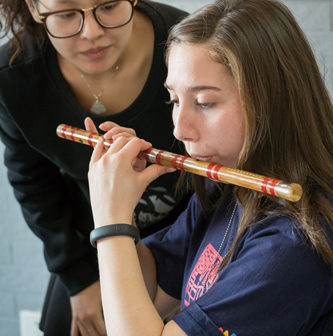Kids these days are faced with an ever-growing array of co-curricular activity choices, from every kind of team sport, to judo, to supplementary academic assistance, to chess. One of most popular options is to learn a musical instrument, but what exactly are the benefits of this for your child?
As it turns out, there are loads of reasons you should introduce your child to a musical instrument, whether in an ensemble or solo. Here are seven:
1. Memory development
According to research, learning to play an instrument stimulates the brain and develops memory as well as cognitive skills. These memory skills are crucial in the classroom.
2. Self-discipline
Playing an instrument requires self-discipline; practicing different skills, going over the music, and organizing lessons are all crucial parts. Skills in patience are also developed in learning an instrument – as the old saying goes, “practice makes perfect”.

3. Social skills
Many children will be encouraged to join an ensemble to practice their instrument, like an orchestra or a brass band, providing them with an opportunity to make friends and socialize with other children. Playing music together with other children will also develop their non-verbal communication skills, by working on keeping in time with one another through body language.
4. Mathematics skills
Research has shown that children who are engaged in learning an instrument also perform better in mathematics than their non-musical counterparts. We’re not saying your child will be the next Einstein, but they might just speak up a little more in their next class.
5. Confidence
By developing a new skill that requires their own hard work and dedication, not to mention sometimes playing in front of other people, children also develop confidence through learning an instrument.

6. Concentration skills
Playing an instrument requires people to concentrate on a number of things at once; tempo, pitch, key, correct fingering, and quality of sound, just to name a few. Playing with others will also require your child to concentrate on staying in time and in pitch with the rest of the group.
7. Cultural education
Finally, learning an instrument will mean that your child will be exposed to a huge variety of music, coming from a wide range of countries and historical periods. Learning this music gives people valuable insight into the events, lifestyle, and values of the people from that particular time period. It’s like a history lesson and a music lesson all wrapped up into one!
Photos: Courtesy of Beijing Shining Jazzy Chorus & Mitchell Pe Masilun,




